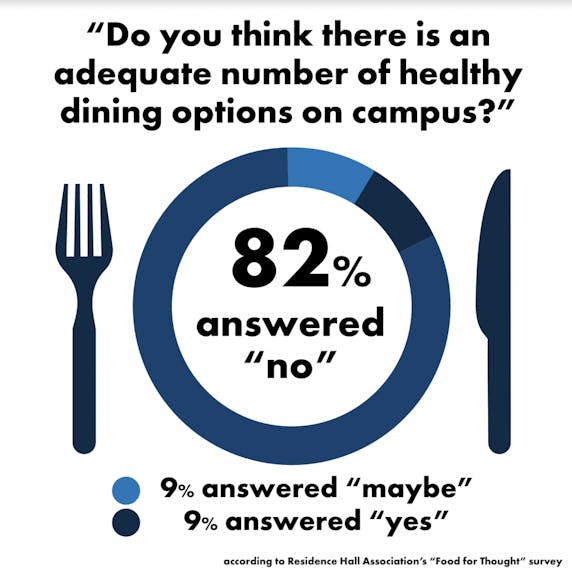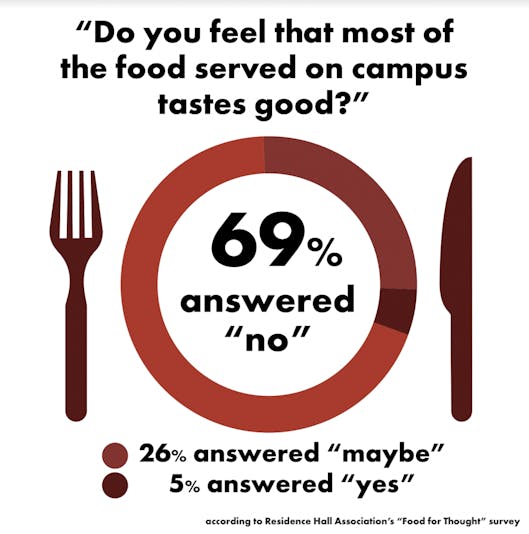As AU begins to accept proposals from new dining vendors in the next few months, students could be facing major changes when it comes to campus food options this fall.
Its current vendor, Aramark, could be replaced as soon as next semester. The company has provided custodial and food services on campus since 2013, and some of its dining proposals and actions toward workers have resulted in protests from students. Most recently, in February, students and parents challenged an AU Dining proposal that would have increased the sophomore plan requirement by $1,000 each semester.
Students are advocating for longer dining hours, improved rights for workers, higher quality food and more small businesses on campus, said Tom Lebert, the chief of staff for the Residence Hall Association and a student representative on the Dining Advisory Committee, which is made up of faculty, students and staff and oversees the vendor selection process.
“There have been major failings...by our current dining provider,” Lebert said. “I think that any new dining service provider will be able to do better on those basics…[and] things that should be expected from any dining program.”
It is possible many of the individual vendors on campus, such as Starbucks and POD, will change under a new provider, according to Lebert. The University will consider bids from several providers, which could include both small distributors and large companies like Aramark, Sodexo and Bon Appétit.
While Charles Smith, the executive director of Auxiliary Services, said in an email that all bidding companies will be treated equally, it is unlikely that Aramark will be re-chosen as the campus’s food provider, a source who has been closely communicating with administrators told The Eagle.
“Our main goal is to improve campus experience,” Lebert said. “We want students to come here because of the dining program.”
How student input is included in the vendor selection process
AU is still workshopping a Request For Proposal, or RFP, as of mid-April, Smith said. Once the RFP is released, vendors will bid on the food service contract and attempt to fulfill AU’s priorities.
The process is expected to take approximately 10 weeks, said Mark Story, who served as the University’s director of communications until last month. The process will take place in early summer, with the goal of having a new provider operating by this fall, Story said.
A new dining vendor could mean that Terrace Dining Room menus and infrastructure will experience an “overhaul,” Lebert said. He added that the new vendor will also decide whether or not it will transition current employees to new long-term positions.
The various franchise locations on campus, including Starbucks, Subway, Einstein Bros. Bagels, Freshii, Elevation Burger, Global Fresh and Pi & Fry may be changed because their contracts are run by Aramark, said Parker Butler, a freshman who serves as a student representative on the dining committee.
Eagle’s Nest POD and Bleecker Street will almost definitely be replaced if a new vendor takes control of the university’s dining contract, Butler said, because POD is an Aramark-specific dining location. Smith said any changes are still being discussed, but he plans to concentrate on student input on which locations are added or removed from campus.
One thing that won’t change next semester are meal plans, which will retain the same pricing for two years after the new contract begins in the fall, Lebert said.
“What's most important is that we match up students’ priorities with priorities of our dining service provider,” Lebert said.
On March 25, the Residence Hall Association hosted a discussion forum allowing students to share their priorities for a new provider. Both Student Government and RHA opened surveys to students after the forum to gauge student opinion beyond those who had attended the event.
The RHA survey garnered 117 responses while the SG survey earned 70. Most students were concerned about current food quality, short operating hours and the lack of small businesses on campus. Tom Gera — who owns the only non-Aramark businesses on campus, including Megabytes Cafe, Asian Flavors, MudBox Cafe, American Cafe and Argo Tea — is currently suing the University for lost revenue after AU ordered Megabytes closed due to rodent issues.
Workers’ rights and the possible inclusion of student workers in TDR and other locations across campus were other areas that students addressed, Lebert said. Perhaps the most agreed-upon issue was the need for 24-hour dining options, he added.
“[The discussion] was about what was feasible, what was important and where tradeoffs might have to exist,” Lebert said.
Priorities that the Dining committee have included, Smith said, are food preparation methods that support “strong nutrition and a healthy lifestyle” as well as offerings that address special diet needs such as vegetarian, vegan, gluten free, Halal and Kosher.
Customer service and expanded hours of service that include “options for students taking evening classes and late-night service for resident students” are also among the committee’s priorities,” Smith said.
Smith added that the University does not yet know which companies will bid on AU’s contract.
“While we don’t know yet which specific vendors might decide to bid once the RFP is released, I can tell you that our team has reached out directly to a number of dining service companies, ranging from regional to national providers,” Smith wrote in an email.

AU’s history with Aramark
AU students, like other students across the country, have strongly opposed Aramark operations on campus. Since the University began its contract with the company in 2013, AU students have voiced their concerns with their dining experience.
In a 2016 Eagle article, students urged the University to provide more gluten-free,vegan and vegetarian options to campus. Students have called for better treatment of employees, better food and better sustainability practices, according to previous Eagle reports.
In October, students protested the removal of Aramark worker Anthony Randolph, who was released from his job for unpaid parking tickets. Students held signs outside of Katzen Arts Center that said Aramark is “pro prison privatization,” “union-busting” and “anti-education,” in protest to Randolph’s treatment. Randolph was later reinstated to his position.
Karen Cutler, Aramark’s vice president of communications and public affairs, did not respond to a request for comment on Aramark’s plans to bid on AU’s contract in March.
AU isn’t the only partner school at which students have campaigned against Aramark. The company has faced intense criticism for its treatment of workers and its ties to the prison industry. Aramark provides dining services to over 500 correctional facilities, and criticism regarding their poor food quality and employee misconduct has led to hunger strikes in prisons across the country, according to a PBS report from January 2017.
Aramark responded to PBS, saying that inmates’ claims of poor food quality were “sabotage” by the inmates themselves. Students at New York University and the University of Chicago protested the company due to its ties to private prisons, with the latter’s protests causing the university to switch its food service to Bon Appétit.
Butler University and Florida State University students protested after bugs were found in dining hall food, and they expressed concerns that the company reduces food quality and sustainability while increasing costs for students and lowering employee wages. Both schools have since signed contracts with new vendors.
Not all universities have had negative experiences with Aramark. Several Georgetown University students supported the school’s 10-year contract extension in 2016 as a way to expand dining hall operating hours and improve food quality.
How likely bidders Sodexo and Bon Appetit have fared at other schools
Two potential bidders on AU’s dining contract, Sodexo and Bon Appétit, have previous and current relationships with the University. Sodexo was AU’s dining vendor from 1998 to 2000, and it recently took over Aramark’s contract for catering and food service at AU’s Washington College of Law in January. Bon Appetit served as AU’s main dining provider from 2005 to 2013.
Sodexo, which operates in 80 different countries across 30,000 sites, said on its website that its goals for universities are “attracting and retaining quality students,” “improving sustainability on and around campus” and “increasing efficiencies and reducing costs on campus.”
AU’s Washington College of Law switched from Aramark dining services to Sodexo in early 2019. The school has experienced different hours of operation, lower costs and an increased level of sustainability under Sodexo, Robert Campe, the associate dean for finance, administration and strategic planning at WCL, said in a January interview.
Still, students have protested Sodexo at some schools across the country. At the University of Hawaii at Mānoa, students protested rising food and meal plan costs in 2018, to which the company responded that higher costs were necessary to maintain a high quality dining experience. Forbes praised the university for its dining quality in January.
Ithaca College in New York partnered with Sodexo for 20 years until a student was hospitalized due to cross-contaminated food poisoning, and the school decided to switch providers, according to The Ithacan, the college’s student newspaper.
The company has also faced criticism for accusations of employees inhumanely treating a female prisoner at a prison in the United Kingdom in 2013 and accusations that employees conducted illegal strip-searches of four inmates at a British prison in 2017.
“Sodexo employees are trained with proper food handling protocol and are committed to safe and accurate labeling which can be found on Sodexo digital platforms and at each station where food is served,” Heidi Bullman, Sodexo’s public relations specialist, said in an email to The Eagle.
Bullman also commented that Sodexo does not provide prison services in the United States. Abroad, though, Bullman said, “Sodexo has been engaged since 1987 in improving living conditions for inmates, especially in the areas of hygiene, health and balanced diets, and in providing training and jobs programs to help them reintegrate with mainstream society upon release.”
Bullman said that she couldn’t provide “on the record comments about bids/contracts” when asked if Sodexo will bid on the RFP.
Bon Appétit has also faced controversies at AU and across the country. The company was critiqued by students in 2013 for firing an AU employee of 28 years, Tracy Lewis, for selling Girl Scout cookies for her daughter while working.
But some employees appreciated their benefits under Bon Appétit. Contracted employees in 2013, like Anthony Randolph, told The Eagle that they had “flexibility” and “voice” under the company’s leadership.
However, in 2017, students at Oberlin College protested the school’s contract with Bon Appétit because the company is owned by Compass Group, a food service company that has a stake in Trinity Services Group, which works in private prisons.
Compass “disposed of its interests in Trinity Services Group” in 2014, according to Bonnie Powell, the director of communications for Bon Appétit. She did not respond to questions about Bon Appétit’s interest in bidding on AU’s food contract.
“Bon Appétit has never done any business with prisons,” Powell wrote in an email to The Eagle. “A subsidiary of Compass provides food service to a very small number of prisons in Canada. This is a tiny percentage of Compass’s business — and zero percent of Bon Appétit’s.”

Shaping a new future for AU Dining
Besides partnering with corporations, AU has made progress with sourcing food locally with the Farm-to-Table program, introduced in fall 2018, according to AU’s dining website. AU owns the Airlie Center, a plot of 300 acres in Virginia. The University uses the property’s 20 acres of farmland to deliver 45,000 pounds of vegetables to TDR.
However, Lebert said dining and administrative officials have completely ruled out the possibility of AU managing its own food service.
The University will have a new contract with a food service vendor by next fall, regardless of which vendor is chosen. Story said that administrators will make their decision with President Sylvia Burwell’s goals of student retention and satisfaction at the forefront.
Future providers have the opportunity to provide students with the dining experience they have been campaigning for, student advocates say. “Everything's on the table” in terms of student priorities and new dining options, Butler said.
“We’ll be [utilizing] student feedback… as a sort of filter for the new provider,” Butler said. “[That feedback] will be useful in terms of holding them accountable through the contract negotiation process.”
kmcdonnell@theeagleonline.com and dpapscun@theeagleonline.com
This article originally appeared in The Eagle's April 2019 print edition.
Update: Since this story’s publication, the University released a request for proposal on April 19 to find new food providers. Read our most recent coverage here to learn more.





